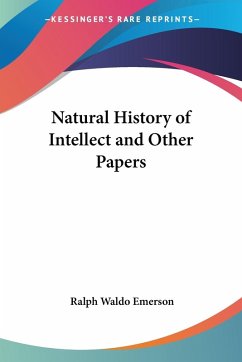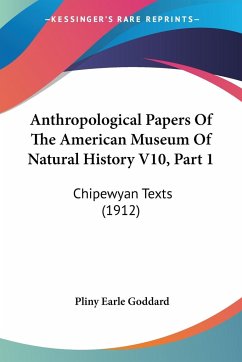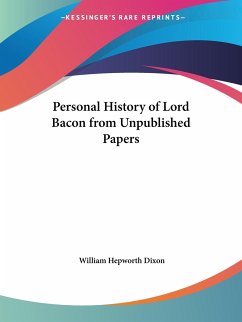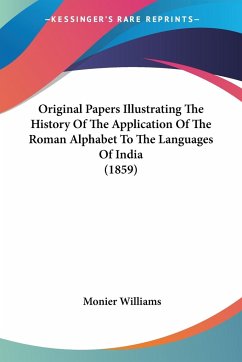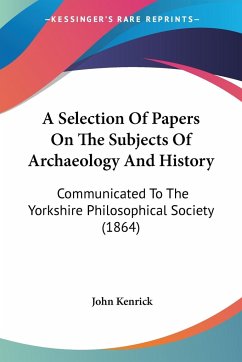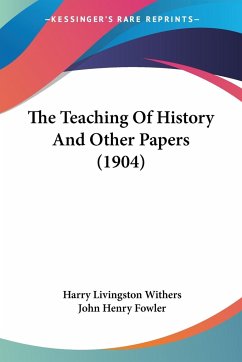Ralph Waldo Emerson
Natural History of Intellect and Other Papers
Ralph Waldo Emerson
Natural History of Intellect and Other Papers
- Broschiertes Buch
- Merkliste
- Auf die Merkliste
- Bewerten Bewerten
- Teilen
- Produkt teilen
- Produkterinnerung
- Produkterinnerung
This scarce antiquarian book is a facsimile reprint of the original. Due to its age, it may contain imperfections such as marks, notations, marginalia and flawed pages. Because we believe this work is culturally important, we have made it available as part of our commitment for protecting, preserving, and promoting the world's literature in affordable, high quality, modern editions that are true to the original work.
Andere Kunden interessierten sich auch für
![Anthropological Papers Of The American Museum Of Natural History V10, Part 1 Anthropological Papers Of The American Museum Of Natural History V10, Part 1]() Pliny Earle GoddardAnthropological Papers Of The American Museum Of Natural History V10, Part 130,99 €
Pliny Earle GoddardAnthropological Papers Of The American Museum Of Natural History V10, Part 130,99 €![Personal History of Lord Bacon from Unpublished Papers Personal History of Lord Bacon from Unpublished Papers]() William Hepworth DixonPersonal History of Lord Bacon from Unpublished Papers33,99 €
William Hepworth DixonPersonal History of Lord Bacon from Unpublished Papers33,99 €![History And Papers History And Papers]() Sterling Iron And Railway CompanyHistory And Papers20,99 €
Sterling Iron And Railway CompanyHistory And Papers20,99 €![Original Papers Illustrating The History Of The Application Of The Roman Alphabet To The Languages Of India (1859) Original Papers Illustrating The History Of The Application Of The Roman Alphabet To The Languages Of India (1859)]() Original Papers Illustrating The History Of The Application Of The Roman Alphabet To The Languages Of India (1859)22,99 €
Original Papers Illustrating The History Of The Application Of The Roman Alphabet To The Languages Of India (1859)22,99 €![Papers Illustrating The History Of The Scots Brigade In The Service Of The United Netherlands, 1572-1782 V3 Papers Illustrating The History Of The Scots Brigade In The Service Of The United Netherlands, 1572-1782 V3]() Papers Illustrating The History Of The Scots Brigade In The Service Of The United Netherlands, 1572-1782 V334,99 €
Papers Illustrating The History Of The Scots Brigade In The Service Of The United Netherlands, 1572-1782 V334,99 €![A Selection Of Papers On The Subjects Of Archaeology And History A Selection Of Papers On The Subjects Of Archaeology And History]() John KenrickA Selection Of Papers On The Subjects Of Archaeology And History19,99 €
John KenrickA Selection Of Papers On The Subjects Of Archaeology And History19,99 €![The Teaching Of History And Other Papers (1904) The Teaching Of History And Other Papers (1904)]() Harry Livingston WithersThe Teaching Of History And Other Papers (1904)19,99 €
Harry Livingston WithersThe Teaching Of History And Other Papers (1904)19,99 €-
-
-
This scarce antiquarian book is a facsimile reprint of the original. Due to its age, it may contain imperfections such as marks, notations, marginalia and flawed pages. Because we believe this work is culturally important, we have made it available as part of our commitment for protecting, preserving, and promoting the world's literature in affordable, high quality, modern editions that are true to the original work.
Produktdetails
- Produktdetails
- Verlag: Kessinger Publishing, LLC
- Seitenzahl: 364
- Erscheinungstermin: 20. September 2004
- Englisch
- Abmessung: 229mm x 152mm x 21mm
- Gewicht: 591g
- ISBN-13: 9781417942060
- ISBN-10: 1417942061
- Artikelnr.: 21076874
- Herstellerkennzeichnung
- Libri GmbH
- Europaallee 1
- 36244 Bad Hersfeld
- gpsr@libri.de
- Verlag: Kessinger Publishing, LLC
- Seitenzahl: 364
- Erscheinungstermin: 20. September 2004
- Englisch
- Abmessung: 229mm x 152mm x 21mm
- Gewicht: 591g
- ISBN-13: 9781417942060
- ISBN-10: 1417942061
- Artikelnr.: 21076874
- Herstellerkennzeichnung
- Libri GmbH
- Europaallee 1
- 36244 Bad Hersfeld
- gpsr@libri.de
Ralph Waldo Emerson was an American essayist, lecturer, philosopher, and poet who led the transcendentalist movement of the mid-19th century. He was seen as a champion of individualism and a prescient critic of the countervailing pressures of society, and he disseminated his thoughts through dozens of published essays and more than 1,500 public lectures across the United States.Emerson gradually moved away from the religious and social beliefs of his contemporaries, formulating and expressing the philosophy of transcendentalism in his 1836 essay "Nature". Following this work, he gave a speech entitled "The American Scholar" in 1837, which Oliver Wendell Holmes Sr. considered to be America's "intellectual Declaration of Independence."Emerson wrote most of his important essays as lectures first and then revised them for print. His first two collections of essays, Essays: First Series (1841) and Essays: Second Series (1844), represent the core of his thinking. They include the well-known essays "Self-Reliance", "The Over-Soul", "Circles", "The Poet", and "Experience." Together with "Nature", these essays made the decade from the mid-1830s to the mid-1840s Emerson's most fertile period. Emerson wrote on a number of subjects, never espousing fixed philosophical tenets, but developing certain ideas such as individuality, freedom, the ability for mankind to realize almost anything, and the relationship between the soul and the surrounding world. Emerson's "nature" was more philosophical than naturalistic: "Philosophically considered, the universe is composed of Nature and the Soul." Emerson is one of several figures who "took a more pantheist or pandeist approach by rejecting views of God as separate from the world."[6]He remains among the linchpins of the American romantic movement,[7] and his work has greatly influenced the thinkers, writers and poets that followed him. When asked to sum up his work, he said his central doctrine was "the infinitude of the private man." Emerson is also well known as a mentor and friend of Henry David Thoreau, a fellow transcendentalist.Ralph Waldo Emerson (May 25, 1803 - April 27, 1882)[5] was an American essayist, lecturer, philosopher, and poet who led the transcendentalist movement of the mid-19th century. He was seen as a champion of individualism and a prescient critic of the countervailing pressures of society, and he disseminated his thoughts through dozens of published essays and more than 1,500 public lectures across the United States.Emerson gradually moved away from the religious and social beliefs of his contemporaries, formulating and expressing the philosophy of transcendentalism in his 1836 essay "Nature". Following this work, he gave a speech entitled "The American Scholar" in 1837, which Oliver Wendell Holmes Sr. considered to be America's "intellectual Declaration of Independence."[6]Emerson wrote most of his important essays as lectures first and then revised them for print. His first two collections of essays, Essays: First Series (1841) and Essays: Second Series (1844), represent the core of his thinking. They include the well-known essays "Self-Reliance",[7] "The Over-Soul", "Circles", "The Poet", and "Experience." Together with "Nature",[8] these essays made the decade from the mid-1830s to the mid-1840s Emerson's most fertile period. Emerson wrote on a number of subjects, never espousing fixed philosophical tenets, but developing certain ideas such as individuality, freedom, the ability for mankind to realize almost anything.

